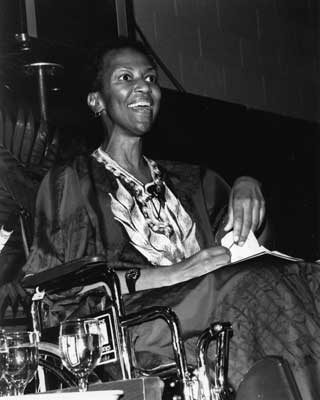The Word from Lansing: Catholic Advocacy in 2021—Be a Light

Posted February 26, 2021
“Sometimes people think they have to do big things in order to make change. But if each one would light a candle, we’d have a tremendous light.”
Sr. Thea Bowman spoke this call-to-action during a 1987 interview with 60 Minutes. A granddaughter of African slaves, a Franciscan Sister of Perpetual Adoration, a teacher, and perhaps a future saint, Sr. Thea lived a life of service to others. She shared her Catholic faith freely, broke down racial and cultural barriers, and promoted greater communication among people of all backgrounds.
Reflecting upon Sr. Thea’s example, each Catholic can also be a source of light and a voice for others. By recognizing that each person was made in the image and likeness of God, believers have the opportunity to advocate for a society that values all, regardless of circumstances or abilities. As the democratic process shapes communities, it is important for Catholic voices to have a presence there, in elections and beyond.
At the federal level, Americans witnessed the forty-sixth president taking the oath of office in January. During his inaugural address, President Joseph Biden mentioned the importance of “[seeing] each other not as adversaries but as neighbors. We can treat each other with dignity and respect”. During the next four years, people of faith are called to hold officials accountable for the policies they pursue, especially considering the impact of those policies on individuals and families on the margins.
The U.S. bishops instruct believers to rise above partisanship and to “focus on what protects or threatens the dignity of every human life”. Already into the president’s four-year term, the U.S. Conference of Catholic Bishops (USCCB) has focused on this goal, ready to engage in a dialogue about shared issues of concern. The organization has expressed gratitude for actions from the Administration in the areas of food and housing needs, immigration reform, and climate change. At the same time, the bishops have spoken out strongly against several of the Administration’s actions, including those which devalue human life:
- In a statement on the anniversary of Roe v. Wade—which legalized abortion through all nine months of pregnancy in the U.S.—President Biden expressed his desire to codify the decision.
- The president reversed the “Mexico City” policy, which had previously prohibited U.S. taxpayer funding from going to organizations that promote or provide abortions overseas.
- President Biden announced he intended to rescind a rule that keeps abortion out of the federal Title X family planning program.
Catholics cannot afford to be silent about policies that disregard or demean the worth of a child of God, including the unborn or those struggling with financial hardship.
At the state level, Michigan Catholic Conference (MCC) is committed to advocating for justice and dignity. The organization has served as the advocacy voice of the Catholic Church in this state since 1963. Over the years, MCC has witnessed the following truth: the policies that are considered, adopted, or rejected by elected officials speak volumes about the society in which Michiganders live. If Catholics and others of faith are committed to “building a world of respect for human life and dignity, where justice and peace prevail,” their presence in the public policy realm is sorely needed.
Sr. Thea demonstrated courage in many difficult situations, taking small steps forward to bring light for others. Now it is our turn. Participate in community and policy conversations. Take a stand and speak up for the dignity of all people, at all stages of life. Join MCC’s Catholic Advocacy Network, and learn how you can become an advocate for the common good. Go be a light.
Michigan Catholic Conference recently issued its ten guiding principles for legislative advocacy during the 2021–2022 session. Learn more about these principles and how they will inform staff action.
